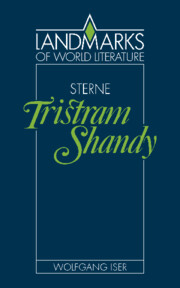II - Writing strategies
Published online by Cambridge University Press: 06 January 2010
Summary
The first-person narrator
Shall we forever make new books, as apothecaries make new mixtures, by pouring only out of one vessel into another? Are we forever to be twisting and untwisting the same rope? forever in the same track – forever at the same pace? Shall we be destined to the days of eternity, on holy days as well as working days, to be showing the relics of learning, as monks do the relics of their saints – without working one – one single miracle with them?
(V, 1, 279)Writing poses the question of how to relate to traditions of writing, and this would seem to entail nothing other than a continual reclassification of that which already exists. Tristram, however, wants writing to consist in rewriting the written, as he demonstrates above by reworking a passage in Robert Burton's Anatomy of Melancholy:
As apothecaries, we make new mixtures every day, pour out of one vessel into another; and as those old Romans robbed all the cities of the world, to set out their bad-sited Rome, we skim off the cream of other men's wits, pick the choice flowers of their tilled gardens to set out our own sterile plots … we weave the same web still, twist the same rope again and again.
(Burton, The Anatomy of Melancholy, pp. 23f.)The Burton text shines like a palimpsest through Tristram's complaint.
- Type
- Chapter
- Information
- Sterne: Tristram Shandy , pp. 55 - 90Publisher: Cambridge University PressPrint publication year: 1988



